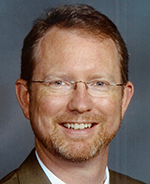By Bob Allen
A Cooperative Baptist Fellowship pastor in St. Louis said any hope for improving race relations lies not in agreement about a non-indictment in the Michael Brown shooting death but in relationships that will grow between people with differing views.
In a blog the day after a grand jury in nearby Ferguson, Mo., decided not to indict a white police officer who killed a black teenager in August, Kirkwood Baptist Church Pastor Scott Stearman recalled lessons he learned following another racially charged shooting in the St. Louis suburb of Kirkwood in 2008.
 Back then Stearman, who is white, joined Jeffrey Croft, pastor of predominantly black Harrison Avenue Missionary Baptist Church in Kirkwood, in reaching out to a racially divided city after an African-American activist barged into a city council meeting and killed two police officers and three city officials before authorities shot him to death.
Back then Stearman, who is white, joined Jeffrey Croft, pastor of predominantly black Harrison Avenue Missionary Baptist Church in Kirkwood, in reaching out to a racially divided city after an African-American activist barged into a city council meeting and killed two police officers and three city officials before authorities shot him to death.
Stearman said those and other conversations sparked by events six years ago continue to bear fruit today.
“Those relationships developed in the aftermath of that tragic shooting continue today and have been at the heart of many good things that have happened in Kirkwood in recent years,” Stearman said in his Nov. 25 blog.
Among them, Kirkwood supports the Community for Understanding and Hope, a group that initiates dialogue and social interaction in hopes of transforming the Kirkwood area into a “prejudice-free community” by creating an environment of understanding and healing.
“I have friendships with a number of black clergy,” Stearman said. “We are working on several social justice initiatives and will continue to do so.”
Stearman said he has confidence in the Ferguson Commission created by Gov. Jay Nixon to study underlying social and economic conditions underscored by unrest in the wake of the death of Michael Brown and acquittal of police officer Darren Wilson, because he knows a couple of the African-American leaders on it.
“They will build relationships across the huge gulf of experience to work constructively,” he said. “They will ensure that needed systemic change isn’t swept under the rug. They will do their best, not to reach agreement on the past, but to construct consensus on building a better tomorrow — ensuring we know each other well enough to hold hands as we get there.”
Stearman has shared the story about the aftermath of the Kirkwood City Council shootings in the context of the New Baptist Covenant, a movement aimed at healing division among Baptists in the United States over issues including race, geography and theology.
In anticipation of the Nov. 24 grand jury decision, Stearman recently preached a sermon reminding that the Bible calls Christians not only to give to charity but also to advocate for social justice.
“This is where, it seems to me, that some of the current protestors in St. Louis have it right,” he said. “Our current status quo is unsustainable, and moreover we Christian people have a responsibility to not only give charitably but to work toward systemic change.”
“There is something happening in St. Louis and around the nation, a recognition that this isn’t about the shooting of just one kid,” Stearman said, “that there has been and is in our society some systemic injustices that some people are seeing that they’ve never seen before.”
“I’m talking about mass incarceration rates,” he said. “I’m talking about a justice system that does not provide good support for those who have been caught up in some very unfortunate criminal actions. I’m talking about poverty that’s endemic in some areas and schools which are under-supported. I’m talking about these kind of things which are not open to interpretation.”
“There are unquestionably injustices in our society, which are objectively and obviously there,” he said.
Stearman said if he’s learned anything since the Kirkwood tragedy, it’s that people “wear very different glasses” when it comes to matters of racial inequality.
“We have very different lenses through which we see the world, and those lenses, those glasses are so fundamentally different, it’s sometimes mind-boggling,” he said. “This one incident that happened in Ferguson in August is seen so radically different by different people.”
Stearman said that’s important to acknowledge because some of the reaction likely to happen after the grand jury decision “is maybe hard for some of us to process.”
Related stories:
Thabiti Anyabwile says Ferguson grand jury gives marching orders for change
St. Louis pastor says racial violence not justified, but anger is
Related commentary:
